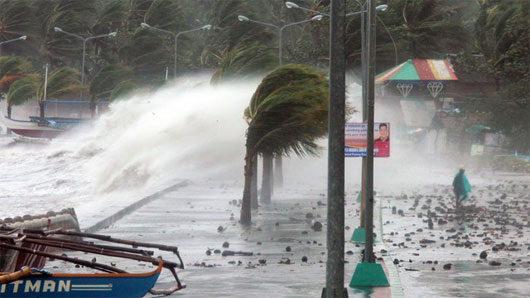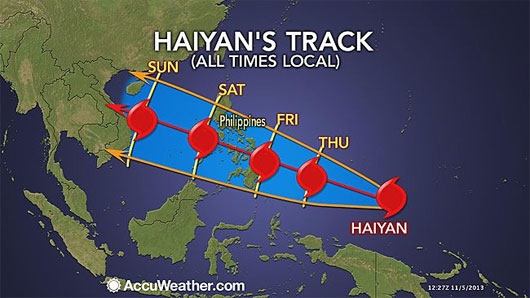Super Typhoon Haiyan and questions about climate change
How can climate change affect storms, super typhoons, tornadoes? Can this effect be calculated? The Guardian newspaper of England has asked questions and answers to this phenomenon.
The most horrible Haiyan super typhoon in history has just happened, so it is still too early to investigate whether global warming has caused a massive storm Haiyan. But there are many reasons to consider this issue. Moreover, people have tools to determine how climate change has affected major storms. These tools have been used in other extreme weather events, providing a very clear and scientific answer about how climate change has dramatically increased the risks of heat and flooding.

So how can climate change affect storms?
Typhoons, super typhoons and tropical storms attract most of their energy from sea warming. Professor Will Steffen of the Australian National University said: "We know the temperature of the sea surface warms a lot throughout the planet, so climate change has a direct effect on the nature of the storm. ".
Another important factor is the temperature difference between the sea level and the peak of the storm, because this temperature difference forms the driving force behind storm formation. Scientists think that climate change is increasing this difference.
Has any scientific research ever mentioned the link between climate change and the increasing intensity of storms?
Professor Myles Allen of Oxford University said: " Now scientists agree that climate change is not a threat to make storms stronger , but there is some controversy and evidence that still exists. there exists a risk of stronger storms. "

The study of natural geoscience (Nature Geoscience) since 2010 has found that global warming will increase the average intensity of storms, while reducing the number of storms. . That means less storms but stronger storm intensity. The newspaper also found that rainfall at the center of storms will increase by 20%.
A 2013 study by Massachusetts Institute of Technology Professor Kerry Emmanuel agreed that the strongest storms would increase, but smaller tornadoes would also increase. The study also found "strong tropical storms in the Pacific Northwest" , such as where the Typhoon Haiyan happened.
In 2011, a comprehensive report from the Intergovernmental Panel on Climate Change concluded that the average wind speed in the storms is likely to increase, as well as the frequency of heavy rainfall rains, But the report also notes the difficulty of connecting changes in complex natural events such as cyclones to climate change.
What does this mean for human and material damage caused by storms?
The damage will become more and more severe. Rising sea levels mean that storms are getting stronger - huge waves hit coastal areas and that is the deadliest danger of storms. Climate change makes the intensity of storms growing. Heavy rains in storms also increase the risk of flooding.

The Philippines was devastated by super typhoon Haiyan
Some extreme weather events are directly linked to climate change. How does this happen?
Scientists have used detailed computer models to copy heat waves, floods or natural disasters. Later, these models were reruned - usually thousands of times, without the addition of heat in the greenhouse gas system emitted by burning fossil fuels. The difference between the results shows the impact of climate change.
A Allen study showed that the historic flood in the UK in 2000 had become 2-3 times more serious, possibly due to global warming. Other research also shows that global warming has caused a severe heat wave in Russia in 2010 that killed 50,000 people three times more severely.
Professor Allen said that the impact of climate change on super typhoon Haiyan could be calculated."This is the question we can answer , " he said. "If we use the same tools that have been used so far to predict the weather, we can get the answer right away."
According to Professor Allen, such studies should be prioritized."Those are the first priorities of the priorities: we need to know how climate change is affecting us, not that it will affect us in the next 100 years. "There is a big misunderstanding that climate change affects everyone. In fact, some people are affected more and some people are affected less. But we don't know who is who."
- Haiyan storm urgently warns about environmental protection
- The North urgently resisted Typhoon Haiyan
- In the next 24 hours, the mind of the super typhoon Haiyan enters the waters of Hue-Binh Dinh
- Typhoon Haiyan is heading into Quang Ngai
- 10,000 people may have died due to Typhoon Haiyan in the Philippines
- Haiyan storm left Vietnam, at least 13 people died
- Tang love covers Tacloban
- Haiyan storm turned to Thanh Hoa
- Why is Typhoon Haiyan so strong?
- The world's strongest storm hit the Philippines
- Quang Ninh suddenly interested in Typhoon Haiyan
- Typhoon Haiyan weakens gradually and goes to China
 Is the magnetic North Pole shift dangerous to humanity?
Is the magnetic North Pole shift dangerous to humanity? Washington legalizes the recycling of human bodies into fertilizer
Washington legalizes the recycling of human bodies into fertilizer Lightning stone - the mysterious guest
Lightning stone - the mysterious guest Stunned by the mysterious sunset, strange appearance
Stunned by the mysterious sunset, strange appearance